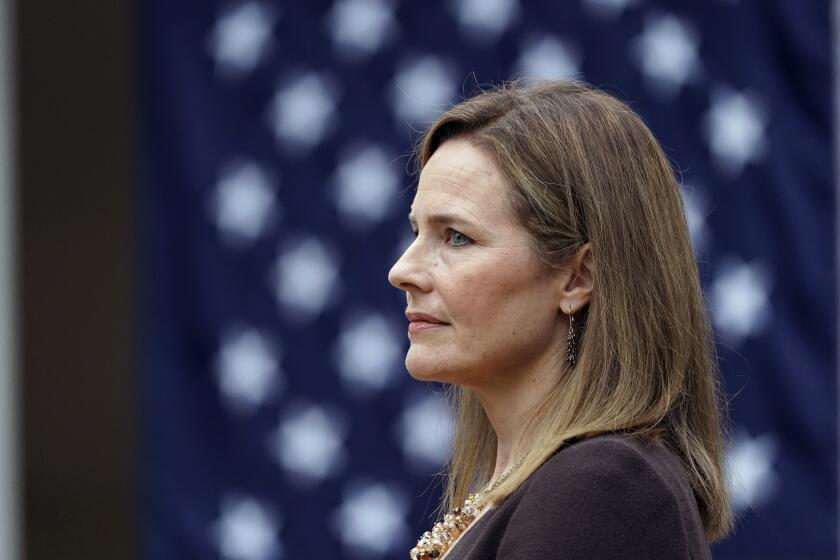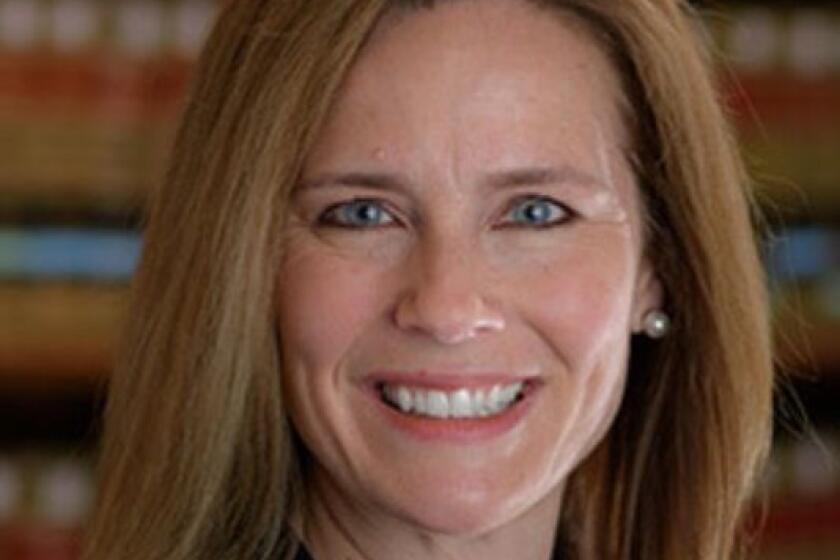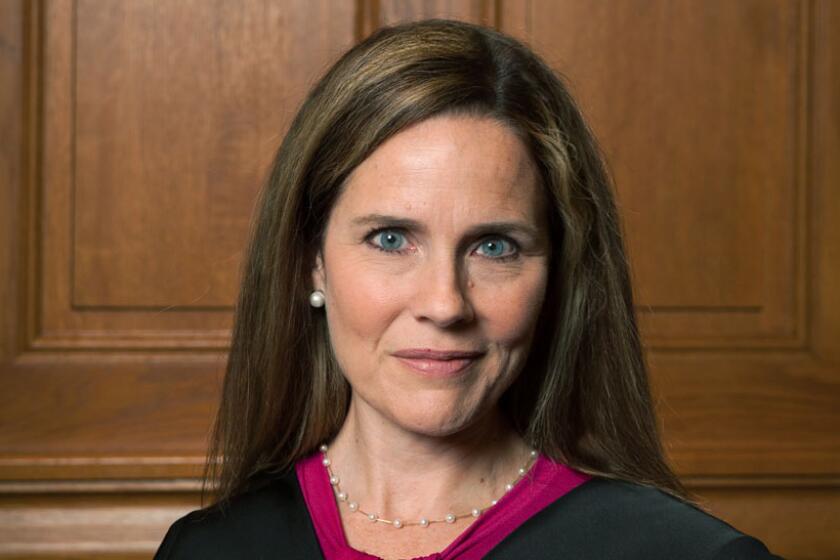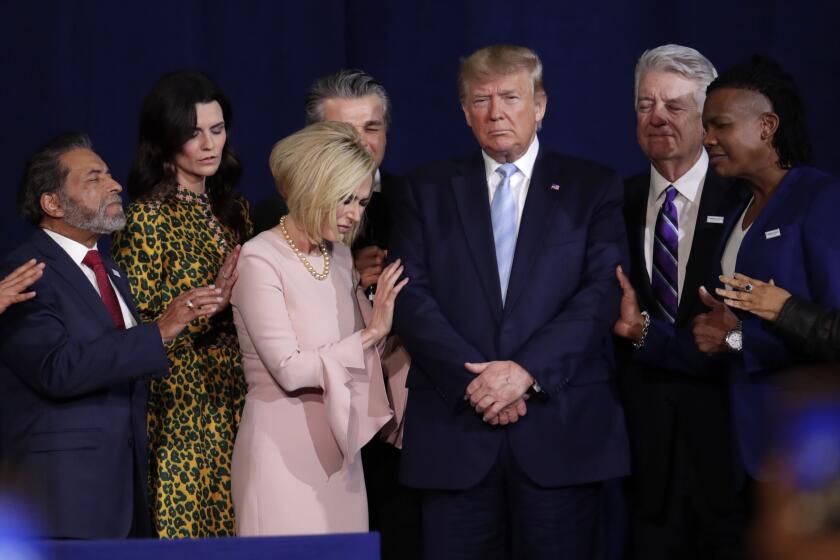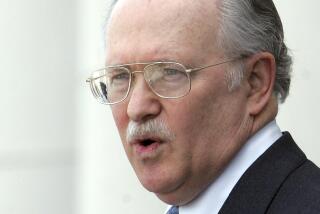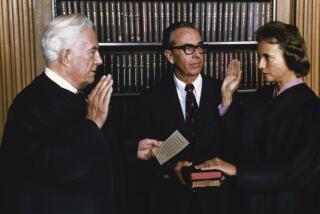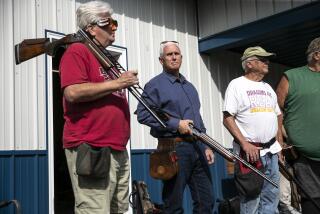Barrett tied to religious group that ex-members say subordinates women
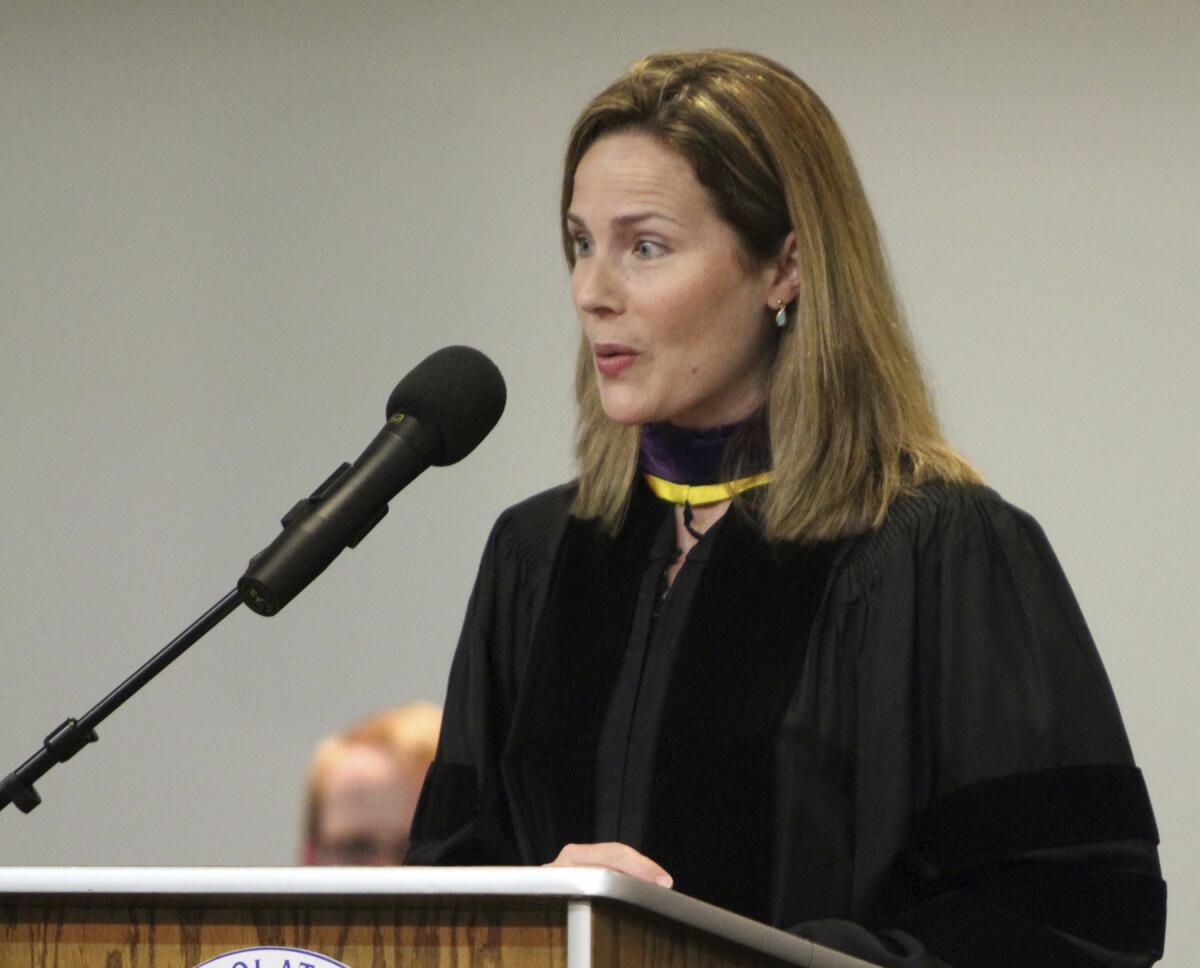
Supreme Court nominee Amy Coney Barrett has close ties to a charismatic Christian religious group that holds that men are divinely ordained as the “head” of the family and faith. Former members of the group, called People of Praise, say it teaches that wives must submit to the will of their husbands.
Barrett, a federal appeals judge nominated by President Trump to succeed the late Supreme Court Justice Ruth Bader Ginsburg, has not commented publicly about her own or her family’s involvement in the group, and a People of Praise spokesman declined to say whether she and her husband are current members.
But Barrett, 48, grew up in New Orleans in a family deeply connected to the organization and, as recently as 2017, served as a trustee at the People of Praise-affiliated Trinity Schools Inc., according to the nonprofit organization’s tax records and other documents reviewed by the Associated Press. Only members of the group serve on the school organization’s board, according to the system’s president.
The AP also reviewed 15 years of back issues of the organization’s internal magazine, Vine and Branches, which has published birth announcements, photos and other mentions of Barrett and her husband, Jesse, whose family has been active in the group for four decades. On Friday, all editions of the magazine were removed from the group’s website.
People of Praise is a religious community based in charismatic Catholicism, a movement that grew out of the influence of Pentecostalism, which emphasizes a personal relationship with Jesus and can include baptism in the Holy Spirit and speaking in tongues. The group organizes and meets outside the purview of a church and includes people from several Christian denominations, but its members are mostly Roman Catholic.
Barrett’s affiliation with a conservative religious group that elevates the role of men has drawn particular scrutiny given that she would be filling the high court seat held by Ginsburg, a feminist icon who spent her legal career fighting for women to have full equality. Barrett, by contrast, is being hailed by religious conservatives as an ideological heir to the late Justice Antonin Scalia, a staunch abortion-rights opponent for whom she clerked as a young lawyer.
Until the late 1980s, no more than two Catholic justices had ever served together.
In accepting Trump’s nomination Saturday, the mother of seven said she shared Scalia’s judicial philosophy.
“A judge must apply the law as written,” Barrett said. “Judges are not policymakers, and they must be resolute in setting aside any policy views they might hold.”
A request to interview Barrett made through the 7th Circuit Court of Appeals in Chicago, where she currently serves as a judge, was declined.
Barrett’s advocates are trying to frame questions about her involvement in People of Praise as anti-Catholic bigotry ahead of her upcoming Senate confirmation hearings.
The circuit judge would cement a 6-3 conservative majority on the Supreme Court — one that might very well overturn Roe vs. Wade.
Asked about People of Praise in a televised interview last week, Vice President Mike Pence said: “The intolerance expressed during her last confirmation about her Catholic faith I really think was a disservice to the process and a disappointment to millions of Americans.”
But some people familiar with the group and charismatic religious groups like it say Barrett’s involvement should be examined before she receives a lifelong appointment to the highest court in the nation.
“It’s not about the faith,” said Massimo Faggioli, a theology professor at Villanova University, who has studied similar groups. He says a typical feature of charismatic groups is the dynamic of a strong hierarchical leadership, and a strict view of the relationship between women and men.
Several people familiar with People of Praise, including some current members, told the AP that the group has been misunderstood. They call it a Christian fellowship, focused on building community. One member described it as a “family of families,” who commit themselves to each other in mutual support to live together “through thick and thin.”
But the group has also been portrayed by some former members, and in books, blogs and news reports, as hierarchical, authoritarian and controlling, where men dominate their wives, leaders dictate members’ life choices, and those who leave are shunned.
The Democrats have no way to stop Amy Coney Barrett’s Supreme Court confirmation. But they should use the hearings to show how she would take away rights.
The AP interviewed seven current and former members of People of Praise, and reviewed its tax records, websites, missionary blogs and back issues of its magazine to try to paint a fuller picture of an organization that Barrett has been deeply involved in since childhood.
Founded in South Bend, Ind., in 1971, the group has about 1,800 adult members nationwide, with branches and schools in 22 cities across the United States, Canada and the Caribbean. All members are encouraged to continue to attend church at their own parishes.
People of Praise’s “covenant” of more than 1,500 words, a copy of which was reviewed by the AP, includes a passage where members promise to follow the teachings and instructions of the group’s pastors, teachers and evangelists.
It’s unclear whether Barrett took the covenant. But a 2006 article in the group’s magazine includes a photo of her attending a People of Praise Leaders’ Conference for Women.
Barrett’s father, Michael Coney Sr., has served as the principal leader of People of Praise’s New Orleans branch and was on the group’s all-male board of governors as recently as 2017. Her mother, Linda Coney, has served in the branch as a “handmaid,” a female leader assigned to help guide other women.
“One of the key principles of People of Praise is freedom, the exercise of our own freedom in following the Lord and in following our own — what we believe, what we think is right,” Michael Coney, 75, said Friday.
Joannah Clark, 47, grew up in People of Praise and became a member as an adult. She acknowledged that the board of governors consists of men, but said that that is not a reflection on the “worth or ability of women.”
“In a marriage, we look at the husband as the head of the family,” Clark said. “This role of the husband as the head of the family is not a position of power or domination. It’s really quite the opposite. It’s a position of care and service and responsibility.”
Clark said she had previously served as a “handmaid.” The term was a reference to Jesus’ mother Mary, who called herself “the handmaid of the Lord.” The organization recently changed the terminology to “woman leader” because it had newly negative connotations after Margaret Atwood’s dystopian novel “The Handmaid’s Tale” was turned into a popular television show.
Pope Francis said Thursday that he will establish a commission to consider the ordaining of female deacons in the Roman Catholic Church, reflecting a willingness to end the church’s tradition of all-male clergy.
Coral Anika Theill joined People of Praise’s branch in Corvallis, Ore., in 1979, when she was a 24-year-old mother of infant twins. She said women were expected to live in “total submission” not only to their husbands, but also the other male “heads” within the group.
When she told her husband she wanted to wait to have more children, Theill said, he accompanied her to gynecological appointments to ensure she couldn’t get birth control.
“I was basically treated like a brood mare,” she said. During her 20-year marriage, Theill had eight children from 11 pregnancies.
Catholic teaching in general frowns on contraception. Catholicism also allows only men to be priests.
I questioned Trump’s moral fitness for office in Christianity Today. The response taught me a lot.
Lisa Williams said her parents joined the Minnesota branch of People of Praise in the late 1970s, when she was a fourth-grader.
“I remember my mother saying a wife could never deny sex to her husband, because it was his right and her duty,” said Williams, 56. “Sex is not for pleasure. It’s for as many babies as God chooses to give you. ... Women had to be obedient. They had to be subservient.”
She recalled People of Praise meetings held in her parents’ living room where members prayed in tongues to cast out demons from a person writhing on the floor, rituals she described as exorcisms.
Coney, Barrett’s father, said the culture of female submission described by some former members was based on misunderstandings of the group’s teachings. As a lawyer himself, he rejected the notion that his daughter’s religious beliefs would unduly influence her opinions if she is confirmed to the high court.
“I think she’s a super lawyer and she will apply the law as opposed to any of her beliefs,” he said. “She will follow the law.”
More to Read
Start your day right
Sign up for Essential California for news, features and recommendations from the L.A. Times and beyond in your inbox six days a week.
You may occasionally receive promotional content from the Los Angeles Times.
